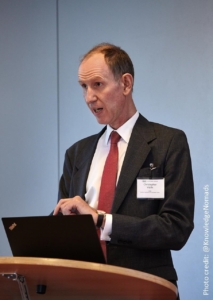 Brexit will close many chapters. One of these, as noted by Prof. Kees Groenendijk (Radboud Universiteit) in a recent post, is the contribution by British judges and advocates general of the Court of Justice of the European Union to EU law, especially EU migration law.
Brexit will close many chapters. One of these, as noted by Prof. Kees Groenendijk (Radboud Universiteit) in a recent post, is the contribution by British judges and advocates general of the Court of Justice of the European Union to EU law, especially EU migration law.
The last British judge was Christopher Vajda, a Wiener-Anspach Alumnus. In a 2018 interview, he mentioned his career-changing fellowship at the Université libre de Bruxelles in 1977/1978. “My plan on graduating was for postgraduate studies in America. But Professor Hamson, the Emeritus Professor of Comparative Law at Cambridge, advised me: ‘Go where the future is: Europe.’ He recommended me for a scholarship at the Université libre de Bruxelles, a course in EU law, all in French. This was career-changing. It led me to consider specialising in EU law, even though it was still in its infancy.”
Reacting to this interview, Prof Jean-Victor Louis, former President of the Foundation, wrote: “Prof C. J. Hamson – a friend of the Foundation’s second president W. J. Ganshof van der Meersch – played an important role in promoting the Foundation and ‘recruiting’ several candidates, including Christopher Vajda, one of his most brilliant students.”
Christopher Vajda has now returned to his former chambers, Monckton Chambers, where another Wiener-Anspach Alumna, Valentina Sloane, works as a barrister.
Here are a few excerpts from the farewell speech that Judge Vajda gave at the CJUE on 12 February 2020. The full text is available on the website of the Court.
“The UK joined the EEC, as it was then called, on 1st January 1973. I was 17 at the time so you will understand that neither EEC law nor this Court formed any part of my life at that time. However, after my law degree in Cambridge I was persuaded to do a postgraduate degree in Brussels in EEC law by the Emeritus Professor of Comparative Law at Cambridge, Jack Hamson. In the 1950s he had written a pioneering English textbook on French administrative law at a time when the concept of administrative law did not yet exist in English law. I went to Brussels way before any Erasmus scheme was in existence and readily confess that one of the attractions of going there was the award of a very generous scholarship which enabled me to divide my time between the University and the bars and restaurants of that city in a manner that I believed did full justice to the principles of diligence and proportionality.”
“It is not surprising that since 1982 I have seen significant change in the working methods of the Court. I am happy to say that most of them have been for the better. The most significant change, and the one most visible to the outside world, is that oral hearings are no longer a formal procedure where the lawyers read out their pleadings, there are no questions from the Bench, and the lawyers then go home. […]. Although it may be said that questioning from the Bench was something that the British legal tradition brought to the Court I am confident that this is now so embedded in the DNA of the Court that it will continue after Brexit.”
“I think the time has come for this Court to embrace live streaming. This would enable many more people to see the Court in action and bring the Court closer to the individual citizen. For my part, I look forward to the day when I can watch my former colleagues in action from the comfort of a sofa anywhere in the world.”


